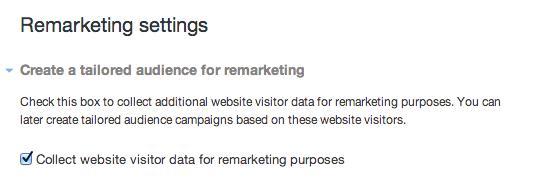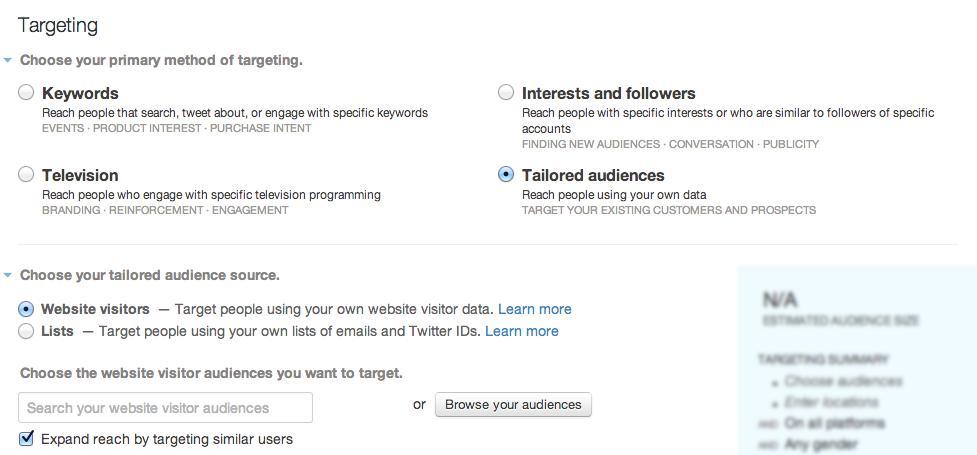Based on a comScore study, retargeting ads led to a 1046% increase in branded search and a 726% lift in site visitation after four weeks of retargeted ad exposure. So, if you desire consumers to recall your brand, developing a strategic retargeting plan is the direction to go.
Moreover, the budget allocation for retargeting is increasing steadily. Retargeting doubled from 7 percent to 14 percent in 2014.

Image via Marketingland.com
Adam Berke, AdRoll president and CMO, stated:
"Retargeting has become a must-have advertising channel for marketers with performance objectives. It solves a clear business problem by helping brands stay engaged with customers who demonstrate intent to purchase."
Retargeting ads are a great way to heighten brand awareness and persuade customers to buy products and services; so let’s talk about how we can effectively execute a campaign that doesn’t waste time or money.
What Does Retargeting Look Like?
Retargeting involves keeping your brand top of mind for consumers.
For instance, when a wife shops for a new watch for her husband’s birthday, she browses through several pages of a store’s website. The wife probably won’t purchase the first watch she sees. Therefore, she leaves the site without purchasing.
Retargeting ad campaigns then display the brand’s product ads on other websites she visits. The goal of these ads is to bring the wife back to the store’s website to purchase the watch she was considering for her husband’s gift.
Here’s a visual of the retargeting process:

Image via Retargeter.com
If used effectively, retargeting ads will draw the potential consumer back to your ecommerce site. However, most companies get sloppy with their campaigns‐bombarding prospects with aggressive advertising too quickly. In return, customers feel invaded and make a conscious decision not to purchase from your store.
Dan Gilmartin, Chief Marketing Officer at BlueConic, explained his frustration with a retargeting ad from HipChat, a chat service for workplaces. After forgetting his password, he revisited the company’s site to merely set up a new one. Nothing else.
Thirty minutes later, Gilmartin was retargeted on Yahoo. The ad offered him to sign up and receive HipChat for free.
Meanwhile, as an existing customer, he was already running the app and getting active messages. See the screenshot of the retargeting ad below.

Image via Blueconic.com
This is the opposite of what you want to do. As Gilmartin points out, HipChat created lazy targeting parameters for its remarketing list. The business wasted its impression budget on existing users.
Done correctly, remarketing includes a custom strategy targeting consumers at different levels of the sales funnel. This list can range from people who merely browsed at products to visitors who spent a particular amount time on your website.
Samantha Mykyte, former Social Media Manager & Digital Content Creator at Wishpond, offers a good example of targeting the right audience with the right offer. Her co-worker loves footwear, especially Hunter boots. Altitude Sports’ retargeting ad featured products adored by Mykyte’s colleague. See the ad below.

Image via Altitude-Sports.com
Why Retargeting Works
At its core, retargeting works because of the psychological principle called the mere-exposure effect. The gist of the theory is that the more times a person is exposed to something, the more likely they are to prefer it.
Television ad frequency has benefited from this principle for decades. When you see the same TV ads multiple times, companies rely on the fact that “you’ll be so familiar with the company or product that you will naturally like and trust it more.”
Similar to other advertising channels, customers can get easily distracted before purchasing your product. We live in a hyperactive society, where within a couple of minutes we can receive one phone call, read three emails, and catch a cab. These interruptions result in customers abandoning shopping carts or forgetting to revisit sites for days.
Nearly three out of five American online buyers said they noticed retargeted ads. Consider this your “second chance” to convince buyers why your product deserves another glance.
To re-pitch your offer, try one or all three of these campaign types:
Direct Link: A direct link to your product purchase page.When targeting high-intent users, people who’ve demonstrated an interest in your brand, your retargeting ad should remind them about the product they viewed last. Make sure the ad is directly linked to the specific product page.
Free Gift: A free item that complements your main product.According to 64% of e-commerce retailers, “free shipping...is the most effective promotion they can offer.” If your store offers free shipping, serving retargeted ads mentioning this incentive can encourage your shoppers to come back and complete the final steps to purchase your products.
Content Advertising: Promote an ad that highlights a useful article that mentions your product.
Not every retargeting ad needs to involve selling products directly. According to The Content Council, 72% of marketers think that branded content is more effective than magazine advertisements. Sometimes, people prefer reading helpful material from a trusted source.
For instance, if you sell high-end fashion apparel, offer customers a how-to guide on how to wash particular fabrics. Give customers the option to feel comfortable with your brand. That trust may lead to more sales over time.
Who Should You Retarget?
Segmentation is the best way to identify your audience for retargeting. With this approach, you can create a strategy focused on the consumer’s behavior. Then, you can give a relevant, customized pitch to the right customer.
Here are a few targeted groups:
Cart Recovery
Focus on where consumers fit into the sales cycle. Visitors will sometimes shop on your site and leave products in the shopping carts. Retarget them with a follow-up email or an ad to remind them of the products they abandoned.
Image via ThePrintful.com
Premium Buyers
Segment customers based on their spending habits. Big spenders will likely purchase more services from you if you retarget with cross-selling or upselling options. Don’t be afraid to communicate your latest products.
ReTargeter discovered that retargeting works well for upselling and cross-selling. By segmenting your current customers, you can expose them to specific upsell-focused messages. Click-through rates and conversion rates fell anywhere from 3% to 5% higher than standard Site-based retargeting.
First-time Visitors
Give new prospects a little nudge. For this particular group, highlight the products that gained their initial attention. Then, direct them back to the same pages.
Rick Maggio from Web Gumption believes Home Depot does retargeting well. While he was searching for a door on the home improvement store’s site, Maggio landed on a specific product page. See below.

Image via Homedepot.com
He eventually left the website. Twenty minutes later, he checked his Facebook account and noticed an ad with the same product. (I ran little test and got the same results, too!)
Image via Webgumption.com
Frequent Visitors
Offer discounts to warm leads, such as frequent visitors to your website. If visitors click on your homepage, view your “about” page, and then browse your product pages, remarket a discount of 25% off their first purchase.
Demographic and Geographic Targeting
Fine tune your segment list by adding demographic and geographic restrictions, like age, gender, or location. This method ensures relevant campaigns reach the right people.
For example,“create a remarketing list for your best age and gender and then combine it with restrictions in terms of bounce rates and average times on site which you consider ideal.”
How to Create a Retargeting List
In the chart below, 67.1% marketers cited that they plan to increase their social’s budget, followed by search. Marketers are seeing the value in retargeting. That’s why these specific budgets are growing.

Image via Statista.com
Here’s a walk-through on how to create a retargeting list on Google Analytics:
-
Click the Shared library link in the navigation bar, below your list of campaigns.

- Click the View link in the "Audiences" section.
- Click the + Remarketing list button.
- Enter a descriptive remarketing list name.
- Choose who you want to add to your list. There are several ways to define who to add to your remarketing list. The simplest of them selects people who have visited a specific page of your website to be added to your list. Here's how to create this type of list:
- In the "Who to add to your list" section, make sure the "Visitors of a page" template is selected.
- In the text box, type the URL of the page or section you want to create the list for.
- Either finish typing the value and press Enter or select one of the suggested options to define your list.
- Enter the membership duration for your list (the default is 30 days). This indicates for how long you want the visitor's cookie to stay on your list.
- If you already have a remarketing tag on your site, leave the "Include past visitors that match these rules" checkbox selected to include recent site visitors who match these rules in your list. Which visitors are eligible also depends on the membership duration you choose and is capped at 30 days. This works for the Display Network only (and doesn't apply to remarketing lists for search ads).
- Click Save.
If you haven't already pasted the remarketing tag on your site, you'll need to copy the tag and paste it on your site. As people visit your site, their cookie IDs will get added to your remarketing list.
You can define more specific lists by using rules and different list templates. See "Creating advanced lists" section in the help section of Google Analytics.
Gain Internal Buy-In With Experimentation
Several options exist to implement your retargeting campaigns. Third-party platforms like Adroll, PerfectAudience, Chango, and Retargeter offer web and social retargeting. You also can retarget through specific platforms, like Facebook and Twitter.
Social media retargeting works well because people are more likely to share and reply to your content when it’s posted from a real account. Web retargeting is great for impressions since the ads show up when your targeted audience surfs the Internet, not just specific social media sites.
Getting buy-in for your retargeting strategy may be a challenge within your company. Howard Gardner, a Harvard developmental psychologist, says presenting data and relevant cases is a good persuasion tactic to use when supporting an argument. So, before you pitch your ideas for a full-fledged campaign, run a few retargeting tests to gain results.
Here’s a step-by-step process on setting up a retargeting campaign on Twitter.
Create the Tag
Create a new website tag from within the Conversion Tracking tab on the Campaign dashboard. If you have an existing conversion tracking tag, you also can edit it to collect data for remarketing.

Image via Twitter
Install the TagInsert the website tag onto the pages you want to collect visitors. When visitors come to this page, they will be added to a “tailored audience.”

Image via Twitter
Create a Campaign Targeting This AudienceCreate a campaign that targets this particular audience. Choose “Tailored audiences” as the targeting type, then choose “Website visitors” as the source. Lastly, select the remarketing audience you just created.

Image via Twitter
Done! Your website visitors will see the promoted account or tweets in their timelines. Use your findings to present your case for retargeting to your colleagues.
Retargeting Campaign Case Studies
Brahmin is a family-owned high-end handbag company. Their business challenges involved shopping cart abandonment and conversions of window shoppers into customers.

Image via Retargeter.com
With the help of ReTargeter and the introduction of retargeting, Brahmin reengaged 20% of shopping cart abandoners. Moreover, Brahmin gained “a strong understanding of where their customers are going online, what sites they head to, and what blogs they read.”
American Apparel struggled with Facebook ads; their team could not track purchasing conversions. Even though their display retargeting was positive, they experienced dips in the conversion rate.

Image via PerfectAudience.com
The company performed an initial trial with Perfect Audience’s Facebook retargeting platform. It helped them deliver different messages to different subsets of users. The results included a 400% increase in ROI and no dip in conversions from other ad sources.
Cosmetics brand retailer Kiehl’s Canada desired to “link their online and in-store databases for digital campaigns.” With an existing CRM database of web signups and historical purchase behavior data, Adroll helped them expand their existing email program into retargeting across web, mobile, and social networks. Here are the results:

Image via Adroll.com
Tips to Retarget, Like a Pro
Your campaign success depends on how you effectively implement key strategies. Here are a few tips worth a try:
1. Exclude Your IP AddressesDon’t waste your budget by retargeting to your colleagues and team members.
To determine the best time to run ads, evaluate conversion rates and ROI by day of the week and the time of day.
3. Be MethodicalPlace conversion and exclusion pixels on your confirmation pages. It makes no sense to continue targeting converts with prospect ads.
4. Block Poor Performing Sites
Not every site is treated equal. By removing non-converting sites, you can lower your overall cost per conversion.
5. Don’t Skimp on DesignIt’s not worth going cheap for a set of cheesy banner designs. If you want a high ROI, spend a little extra for eye-catching ads.
6. Use Old School Marketing TacticsShiny new techniques are cool, but don’t forget the tried-and-tested techniques, like using social proof in your retargeting ads.
Final Thoughts
So, what’s the takeaway? If you’re not retargeting, start today.
And if you’re not getting results, reevaluate your current methods and use the above tips and examples as a guide.
People visit your site everyday. Capture that data. Then, leverage your findings to retarget visitors effectively.
Read more
- How to Strengthen Your Marketing Using Emotional Intelligence
- Returning Ecommerce Visitors: How to ‘Nudge’ Non-Buyers into Taking the Customer Leap
- Gift Wrapping in Ecommerce: How to Boost AOV This Holiday Season
- Omnichannel Inventory Management: Solving Optimization Challenges to Increase Profits
- How to Block the Ad Blockers & Whether You Should
- Overhauling Your Customer Acquisition Model: How to Spend Your Budget Where It Really Counts
- Customer Retention: How to Turn New Shoppers into Repeat Customers
- How to Reduce Post-Holiday Returns
- New Ecommerce Visitors: How to Serve Up Their Hidden Desires and Pull 'Em into Your Online Funnel
- Cross-Device Ad Targeting: What It Is, And How to Master It





